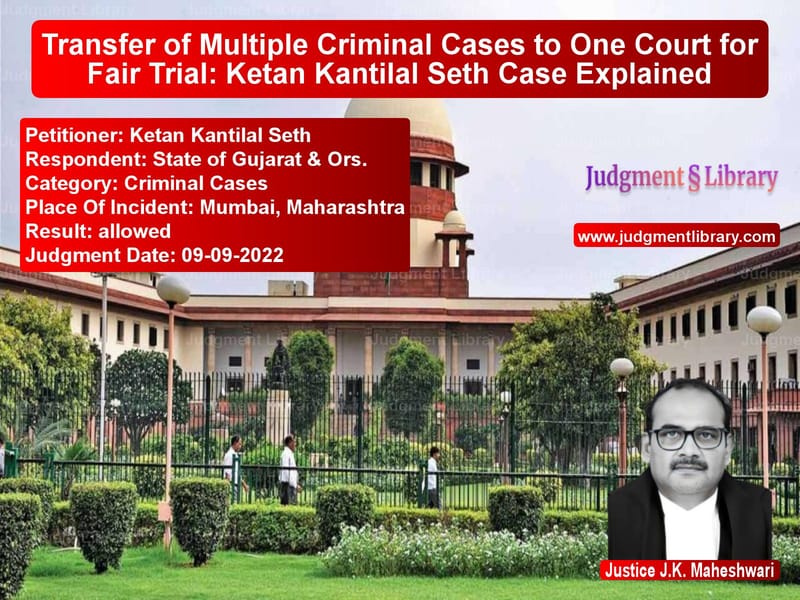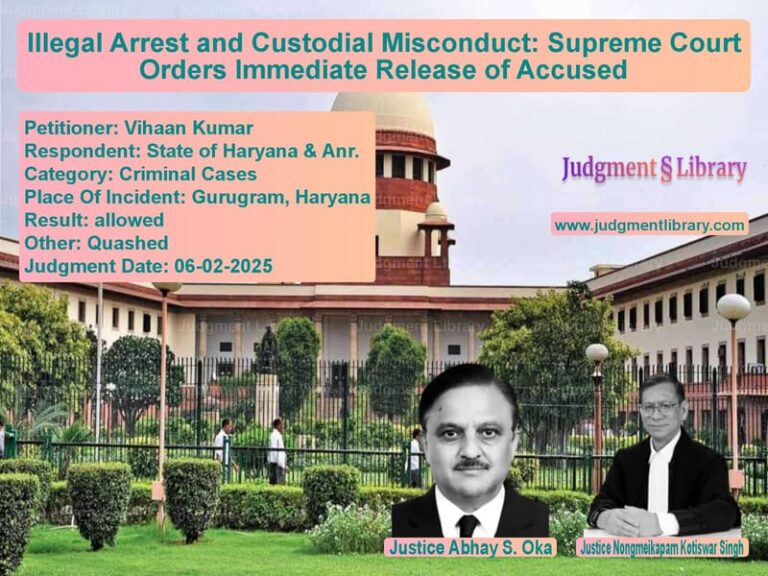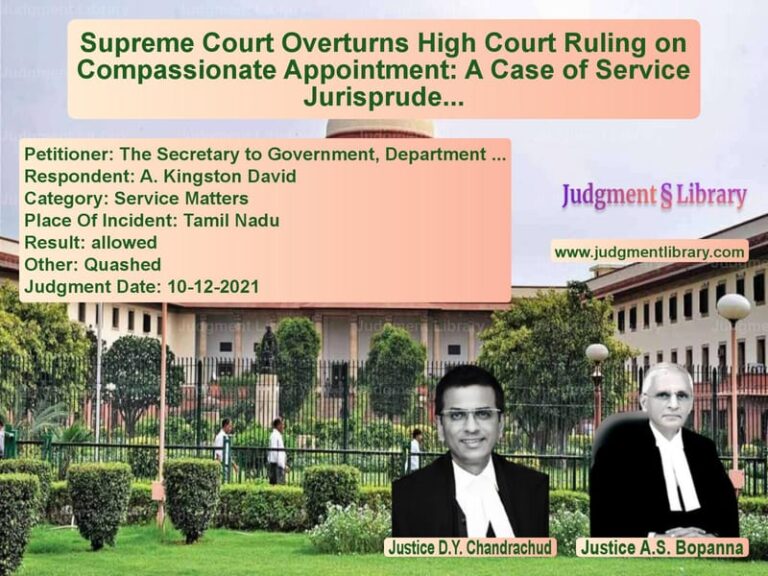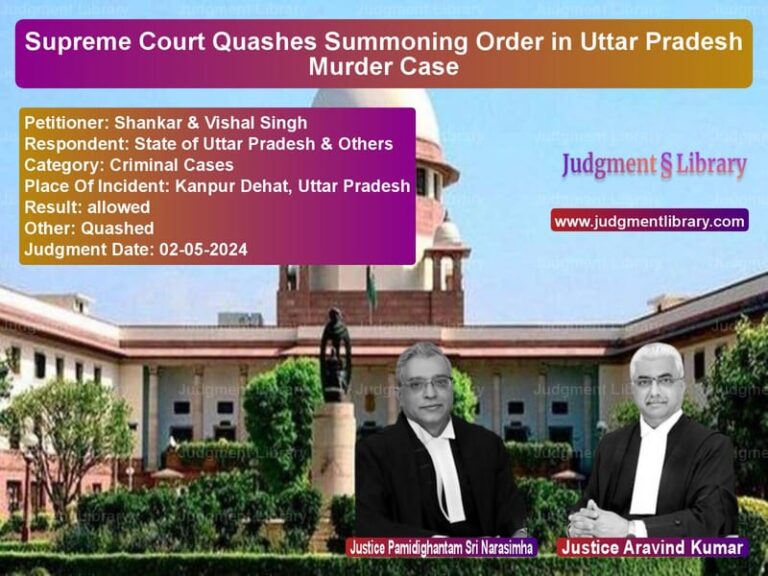Transfer of Multiple Criminal Cases to One Court for Fair Trial: Ketan Kantilal Seth Case Explained
The case of Ketan Kantilal Seth v. State of Gujarat & Ors. highlights the complexities surrounding the transfer of multiple criminal cases to one jurisdiction in the interest of a fair trial. The petitioner, Ketan Kantilal Seth, had sought the transfer of 16 criminal cases pending across four different states to a single court in Mumbai, citing the convenience of trial and the need for expeditious justice. This judgment discusses the legal grounds for such transfers and examines the broader implications for criminal jurisprudence.
Background of the Case
The petitioner was involved in a series of criminal cases linked to fraudulent activities concerning government securities, in which he and others were accused of defrauding investors. These allegations stemmed from the actions of M/s Home Trade Limited, a company in which Seth was a director. The cases were spread across four states: Gujarat, Maharashtra, New Delhi, and West Bengal, with similar allegations in each. The petitioner sought to transfer these cases to Mumbai, where a few cases were already pending, for convenience and expeditious disposal.
The cases related to the petitioner were primarily concerned with the unauthorized sale of government securities and the misappropriation of the funds raised. Seth contended that transferring all cases to Mumbai would expedite the process, reduce logistical challenges, and ensure that the trial was fair, given that many witnesses were located in Mumbai, and most transactions had taken place there.
The Petitioner’s Arguments
Dr. A.M. Singhvi, Senior Advocate for the petitioner, argued that the primary reason for the petition was the multiplicity of cases in various states, each with similar charges and overlapping witnesses. He emphasized the following points:
- The commonality of facts in all FIRs against the petitioner.
- The geographical challenge and the logistical burden on witnesses who would have to appear in multiple courts across different states.
- The substantial delay in the proceedings, most of which had been pending for nearly two decades, with many cases still in the initial stages.
- The importance of consolidating the trials to avoid unnecessary delays and high expenses, ensuring that the trial was conducted in a more organized and efficient manner.
Dr. Singhvi further contended that most of the transactions had taken place in Mumbai, and a large number of relevant witnesses were from this city, which justified the transfer of cases to a court in Mumbai.
The Respondent’s Arguments
In response, the State of Gujarat opposed the transfer on the grounds that the petition for transfer was filed belatedly. The State’s counsel argued that one of the cases (C.C. No. 147/2002) was nearing its final stage, and it would be prejudicial to transfer the case at such a late stage of proceedings.
Shri Tushar Mehta, representing the respondent, argued that transferring the case at this stage could delay the proceedings further, especially considering the progress of one particular case that was already at the final stage. The State also argued that such a transfer might disrupt the trial process and cause undue delay in delivering justice.
Read also: https://judgmentlibrary.com/supreme-court-acquits-two-trade-union-leaders-in-assam-murder-case/
The Court’s Analysis
The Supreme Court, after considering the arguments from both sides, focused on the core issue of whether it was necessary to transfer the cases to a single court in Mumbai for a fair trial. The Court examined the legal framework under Section 406 of the CrPC, which empowers the Supreme Court to transfer criminal cases to ensure a fair trial and secure the ends of justice.
The Court recognized that the petitioner’s argument for convenience, as well as the commonality of facts in the various FIRs, made a strong case for the transfer. The Court noted that most of the accused and witnesses were common across the cases, and many of the alleged transactions took place in Mumbai, further justifying the need for a consolidated trial in that jurisdiction.
Additionally, the Court highlighted the practical difficulties involved in having multiple trials in different states, which resulted in delays and logistical challenges for both the accused and the witnesses. The Court found that such delays could be avoided by consolidating the trials in one court, ensuring that justice was dispensed more efficiently.
Intervention Application
During the proceedings, an application for intervention was filed by Omprakash Bhaurao Kamdi, who sought permission to intervene in the case. Kamdi claimed that he was a necessary party, as he was involved in the financial transactions related to the case. However, the Court dismissed the intervention application, stating that Kamdi had no direct involvement in the criminal cases and his intervention was not necessary for the purposes of the transfer petition. The Court emphasized that intervention in criminal cases should be allowed only if it serves the public interest or if the applicant is directly affected by the proceedings.
Read also: https://judgmentlibrary.com/supreme-court-modifies-sentence-in-maharashtra-assault-case/
Final Judgment
The Court ultimately ruled in favor of the petitioner and allowed the transfer of the 16 criminal cases to the Principal Judge of the Bombay City Civil and Sessions Court. The Court directed the following:
- All 16 criminal cases pending in different states shall be transferred to the Bombay City Civil and Sessions Court.
- The Principal Judge is at liberty to assign the cases to any court within his jurisdiction, ensuring that the cases are handled efficiently.
- The transferor courts must transmit the case records to Mumbai by October 31, 2022.
- All the accused persons in the concerned cases must appear before the Principal Judge in Mumbai on November 14, 2022.
- The Principal Judge must ensure that the charges are framed within two months and that the trial is completed within two years, with day-to-day hearings where possible.
The Court’s decision was based on the principles of expediency, convenience, and the right to a fair trial, ensuring that the trial process would not be unduly delayed or fragmented across multiple jurisdictions.
Significance of the Judgment
This judgment highlights the Court’s willingness to use its power under Section 406 of the CrPC to consolidate multiple trials into a single jurisdiction when it serves the ends of justice. It demonstrates the importance of considering practical difficulties, such as the presence of common witnesses and the geographical spread of criminal cases, in the interest of ensuring a timely and fair trial. The Court’s dismissal of the intervention application also underscores the need for third-party interventions to be directly relevant to the case at hand.
Overall, this ruling strengthens the judicial approach to handling complex multi-jurisdictional criminal cases and emphasizes the need for efficiency and fairness in the judicial process.
Petitioner Name: Ketan Kantilal Seth.Respondent Name: State of Gujarat & Ors..Judgment By: Justice J.K. Maheshwari.Place Of Incident: Mumbai, Maharashtra.Judgment Date: 09-09-2022.
Don’t miss out on the full details! Download the complete judgment in PDF format below and gain valuable insights instantly!
Download Judgment: ketan-kantilal-seth-vs-state-of-gujarat-&-o-supreme-court-of-india-judgment-dated-09-09-2022.pdf
Directly Download Judgment: Directly download this Judgment
See all petitions in Bail and Anticipatory Bail
See all petitions in Judgment by J.K. Maheshwari
See all petitions in allowed
See all petitions in supreme court of India judgments September 2022
See all petitions in 2022 judgments
See all posts in Criminal Cases Category
See all allowed petitions in Criminal Cases Category
See all Dismissed petitions in Criminal Cases Category
See all partially allowed petitions in Criminal Cases Category







